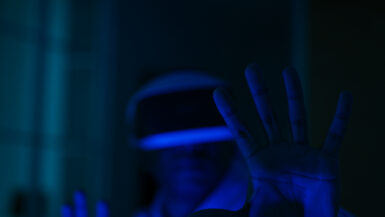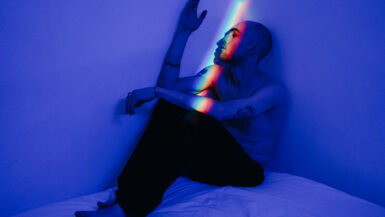In today’s fast-paced digital era, our exposure to artificial light, predominantly blue light, has significantly increased, raising concerns about its potential consequences on our well-being. This article, titled “The Effect of Blue Light on Sleep and Weight Gain,” delves into the intricate dynamics between blue light exposure, sleep quality, and its subsequent impact on weight management. By exploring the latest scientific research and expert insights, we aim to provide our readers with an in-depth understanding of how blue light affects our circadian rhythm, sleep patterns, and weight regulation. Furthermore, we will discuss practical strategies to mitigate these effects and promote a healthy balance between productivity and wellness.
Blue Light Exposure and Hormonal Imbalances
As we delve deeper into the relationship between blue light exposure and its influence on our health, it is vital to examine the hormonal imbalances that can arise from excessive exposure to blue light. This section will focus on the disruption of melatonin and cortisol levels in our body, which are essential hormones for regulating our sleep-wake cycle and overall well-being. Moreover, we will explore the connection between these hormonal imbalances and weight gain.
Melatonin Suppression: The Sleep Hormone Under Siege
Melatonin is a hormone produced by the pineal gland in our brain, and it plays a critical role in regulating our sleep-wake cycle. The production of melatonin increases in the evening and peaks during the night, signaling our body to prepare for sleep. However, exposure to blue light, especially in the evening, has been shown to suppress melatonin production, leading to difficulties in falling asleep and poor sleep quality. A report titled “Blue Light and Sleep: A Guide for Seniors” further highlights the significant impact of blue light on the sleep patterns of older adults, who may already experience age-related sleep disturbances.
Cortisol Disruption: The Stress Hormone Gone Awry
Cortisol, commonly known as the stress hormone, is released by our adrenal glands in response to stress and low blood sugar levels. It is essential for maintaining a healthy balance between our energy levels and stress response. However, research has shown that prolonged exposure to blue light can lead to increased cortisol production, causing a disruption in our natural circadian rhythm. This disruption can result in increased stress, anxiety, and sleep disturbances, further exacerbating hormonal imbalances.
Weight Gain: The Consequence of Hormonal Imbalances
The disruption of melatonin and cortisol levels due to blue light exposure has a significant impact on our body’s ability to regulate weight. Insufficient or poor-quality sleep can lead to an increased appetite for high-calorie foods, promoting weight gain. Furthermore, high cortisol levels can contribute to an increased accumulation of abdominal fat, leading to obesity and related health complications. Thus, addressing the hormonal imbalances caused by blue light exposure is crucial for maintaining a healthy weight and overall well-being.
In summary, understanding the intricate relationship between blue light exposure and hormonal imbalances is essential for promoting healthy sleep patterns and weight management. By recognizing the impact of blue light on our melatonin and cortisol levels, we can take proactive steps to mitigate its effects, fostering a healthier balance between productivity and wellness.
The Connection Between Sleep Deprivation and Weight Gain
In this section, we will delve into the connection between sleep deprivation and weight gain, exploring the various mechanisms that contribute to this relationship. By understanding these factors, our readers can make informed decisions about their lifestyle habits and implement strategies to mitigate the adverse effects of blue light exposure on their sleep and weight management.
Disrupted Appetite Regulation: The Role of Ghrelin and Leptin
Sleep deprivation has been shown to affect the balance of hunger-regulating hormones, ghrelin and leptin. Ghrelin, often referred to as the “hunger hormone,” stimulates appetite, while leptin sends signals to the brain to suppress hunger. When sleep is compromised, ghrelin levels rise, and leptin levels decrease, leading to an increased appetite and a preference for high-calorie, unhealthy foods. This disruption in appetite regulation can contribute to weight gain and increase the risk of obesity.
Reduced Energy Expenditure: The Impact on Metabolism and Physical Activity
Lack of sleep has also been found to negatively affect our body’s energy expenditure, both through a decrease in resting metabolic rate and a reduction in physical activity levels. When sleep-deprived, individuals tend to feel fatigued and less motivated to engage in physical activity, leading to a sedentary lifestyle and decreased energy expenditure. This, in turn, can contribute to weight gain and a higher risk of obesity-related health complications.
Impaired Insulin Sensitivity: A Pathway to Obesity and Diabetes
Research suggests that sleep deprivation can lead to impaired insulin sensitivity, a condition in which the body’s cells become less responsive to insulin, the hormone responsible for regulating blood sugar levels. This can result in increased blood sugar levels and a higher risk of developing type 2 diabetes. Moreover, insulin resistance has been linked to weight gain and obesity, as the body struggles to process glucose effectively, leading to fat accumulation.
Challenging the Myths: Understanding the Facts About Blue Light and Sleep
Many misconceptions surround the topic of blue light and sleep, which can lead to confusion and misinformation. To gain a more accurate understanding of this complex relationship, we recommend reading our article on “Blue Light and Sleep: Myths vs. Facts“. This resource will provide you with evidence-based information and help you make informed decisions about managing your exposure to blue light.
In essence, sleep deprivation significantly impacts weight management through disrupted appetite regulation, reduced energy expenditure, and impaired insulin sensitivity. By recognizing the connection between blue light exposure and sleep deprivation, individuals can take proactive measures to minimize its effects and maintain a healthy lifestyle.
Tips to Minimize Blue Light Impact on Sleep and Weight
In this section, we aim to provide practical and effective tips to help our readers minimize the impact of blue light exposure on sleep quality and weight management. By incorporating these strategies into your daily routine, you can foster a healthier balance between productivity and wellness while mitigating the adverse effects of blue light on your overall well-being.
Establish a Consistent Sleep Schedule
Creating a consistent sleep schedule is one of the most effective ways to support healthy sleep patterns and minimize the effects of blue light on your sleep and weight. By going to bed and waking up at the same time each day, you help regulate your body’s internal clock and improve the quality of your sleep. A regular sleep schedule can also promote better weight management by maintaining hormonal balance and reducing the risk of sleep deprivation-related weight gain.
Reduce Evening Screen Time
Given the suppressive effects of blue light on melatonin production, it is crucial to limit your exposure to screens during the evening hours. Aim to disengage from electronic devices, such as smartphones, tablets, and computers, at least one hour before bedtime. Instead, engage in relaxing activities, such as reading a physical book, practicing mindfulness meditation, or enjoying a warm bath, to help prepare your body and mind for a restful night’s sleep.
Utilize Blue Light Filtering Technology
Several tools and technologies can help reduce the amount of blue light emitted by electronic devices. Consider installing blue light filtering software, such as f.lux or Night Shift, on your computer and smartphone. Additionally, you can use blue light blocking glasses, which are designed to filter out the harmful blue light wavelengths while allowing other beneficial wavelengths to pass through. These interventions can help minimize the impact of blue light on sleep and weight, particularly if screen time is unavoidable during the evening hours.
Optimize Your Sleep Environment
Creating a sleep-friendly environment is essential for promoting restorative sleep and minimizing the effects of blue light exposure. Ensure that your bedroom is dark, quiet, and cool, as these conditions are conducive to restful sleep. Blackout curtains, white noise machines, and a comfortable room temperature can significantly improve your sleep quality. Furthermore, keep electronic devices out of the bedroom to reduce blue light exposure and establish a designated space for relaxation and sleep.
Expose Yourself to Natural Light During the Day
Exposure to natural light during the day can help regulate your circadian rhythm and counteract the effects of artificial blue light. Make an effort to spend time outdoors, particularly in the morning, to boost your mood, energy levels, and overall well-being. If outdoor exposure is limited, consider using a light box, which emits a bright light that mimics natural sunlight, to help regulate your sleep-wake cycle.
By implementing these practical tips, you can effectively minimize the impact of blue light exposure on your sleep quality and weight management. Embracing these strategies will not only help you maintain a healthy balance between productivity and wellness but also support your overall well-being in today’s digital age.
Understanding Blue Light and Its Sources
As we continue to explore the impact of blue light on sleep and weight gain, it is crucial to gain a comprehensive understanding of blue light itself and its various sources. In this section, we aim to provide our readers with a detailed overview of blue light, its properties, and the common sources of blue light exposure in our daily lives. By gaining a deeper understanding of blue light and its sources, we can better appreciate its potential effects on our health and take appropriate steps to mitigate its adverse consequences.
Unveiling the Mystery: What is Blue Light?
Blue light is a part of the visible light spectrum, characterized by its short wavelengths and high energy levels. With wavelengths ranging from 380 to 500 nanometers, blue light sits on the border of ultraviolet (UV) light and has been associated with various physiological effects on our bodies. While blue light is naturally present in sunlight, it has become increasingly prominent in our lives due to its widespread use in artificial lighting and electronic devices.
Sunlight: The Original Blue Light Source
The primary source of blue light is, in fact, sunlight. Blue light from the sun plays a crucial role in regulating our circadian rhythm and maintaining our overall well-being. Exposure to natural blue light during the day helps to keep our sleep-wake cycle in sync and promote alertness and cognitive functioning. However, the benefits of blue light can quickly turn into drawbacks when we are exposed to it during the evening hours, disrupting our sleep patterns and impacting our health.
LED and Fluorescent Lighting: A Modern Dilemma
In recent years, there has been a significant shift towards the use of LED and fluorescent lighting in homes, offices, and public spaces. These energy-efficient lighting options emit a higher proportion of blue light compared to traditional incandescent bulbs, contributing to our increased exposure to blue light in indoor environments. As a result, it is essential to be aware of the potential impact of artificial lighting on our sleep and overall well-being, particularly in the hours leading up to bedtime.
Electronic Devices: Screens Everywhere
Perhaps the most notorious and ubiquitous source of blue light exposure in our modern lives is electronic devices. Smartphones, tablets, computers, and televisions all emit varying levels of blue light, which can be particularly harmful when used in close proximity to our eyes. With the widespread use of electronic devices for work, communication, and entertainment, it is essential to recognize and manage the potential effects of blue light on our sleep and weight management.
Blue Light vs. Other Colors: Why Blue Light Matters
It is important to note that not all colors of light have the same impact on our sleep and overall health. Blue light is unique in its ability to suppress melatonin production and disrupt our circadian rhythm, whereas other colors, such as red and yellow light, have minimal effects on sleep regulation. Understanding this distinction is crucial in order to make informed decisions about lighting and screen usage, particularly during the evening hours when blue light exposure can have the most significant impact on our sleep patterns.
Armed with a thorough understanding of blue light and its various sources, we are better equipped to navigate the challenges of living in a technology-driven world. By acknowledging the potential impact of blue light on our sleep and weight management, we can implement strategies to minimize its harmful effects and promote a healthier balance between productivity and well-being.
How Blue Light Affects Sleep Quality
In this subsection, we delve into the ways in which blue light exposure can impact sleep quality, focusing on its effects on melatonin production, circadian rhythm, and sleep architecture. Gaining a comprehensive understanding of these factors will help our readers appreciate the importance of managing blue light exposure to promote restorative sleep and maintain a healthy weight.
Melatonin Suppression: A Barrier to Restorative Sleep
As previously mentioned, melatonin is a hormone that plays a crucial role in regulating our sleep-wake cycle. The presence of blue light can suppress the production of melatonin, which in turn can lead to difficulties in falling asleep and poorer sleep quality. Moreover, the suppression of melatonin by blue light exposure has been shown to be dose-dependent, with higher levels of exposure leading to greater melatonin suppression. Therefore, minimizing blue light exposure in the evening hours is essential for ensuring adequate melatonin production and promoting restful sleep.
Disruption of Circadian Rhythm: Throwing Off Our Internal Clock
Our circadian rhythm, or internal clock, is responsible for synchronizing various physiological processes with the 24-hour day-night cycle. One of the primary functions of our circadian rhythm is to regulate our sleep-wake cycle, ensuring that we feel alert and awake during the day and sleepy at night. Blue light exposure, particularly in the evening, can disrupt our circadian rhythm by suppressing melatonin production and delaying the onset of sleep. This disruption can lead to sleep disturbances, such as insomnia and fragmented sleep, which can negatively impact our overall sleep quality and well-being.
Altered Sleep Architecture: Compromising the Balance of Sleep Stages
Sleep architecture is the term used to describe the structure and organization of our sleep, which consists of different stages, including light sleep, deep sleep, and rapid eye movement (REM) sleep. Each stage of sleep serves a specific purpose, such as memory consolidation, cellular repair, and emotional regulation. Blue light exposure has been found to alter sleep architecture by reducing the amount of time spent in deep sleep and REM sleep, which are crucial for restorative sleep and cognitive functioning. Consequently, excessive blue light exposure can compromise the balance of sleep stages, leading to poorer sleep quality and a range of potential health consequences.
Taking into account the various ways in which blue light exposure can negatively impact sleep quality, it is clear that managing our exposure to this high-energy wavelength is essential for promoting restorative sleep and maintaining overall health. By implementing strategies to minimize blue light exposure, such as establishing a consistent sleep schedule, reducing evening screen time, and optimizing our sleep environment, we can preserve our sleep quality and mitigate the potential adverse effects of blue light on our well-being.





Leave a reply